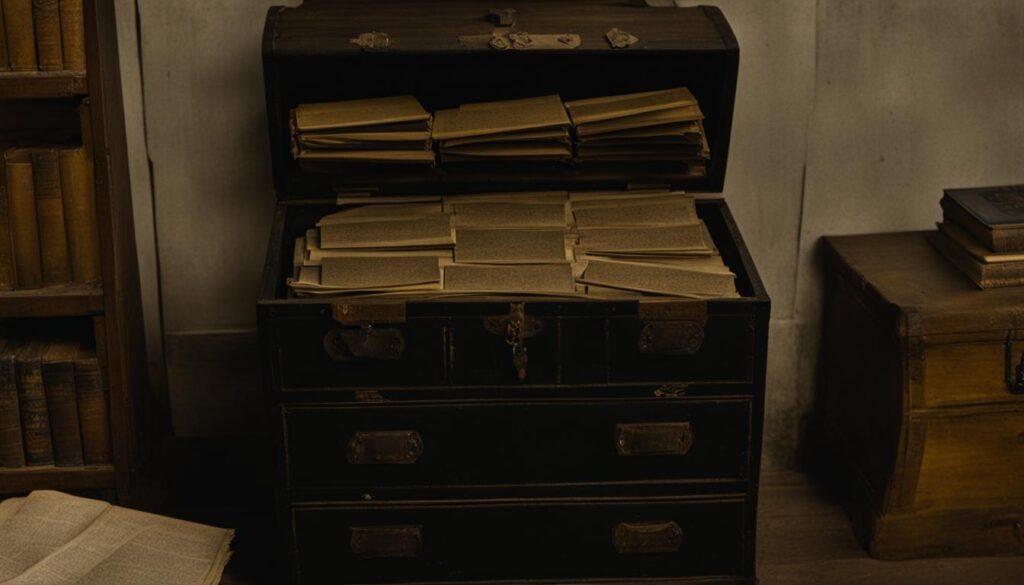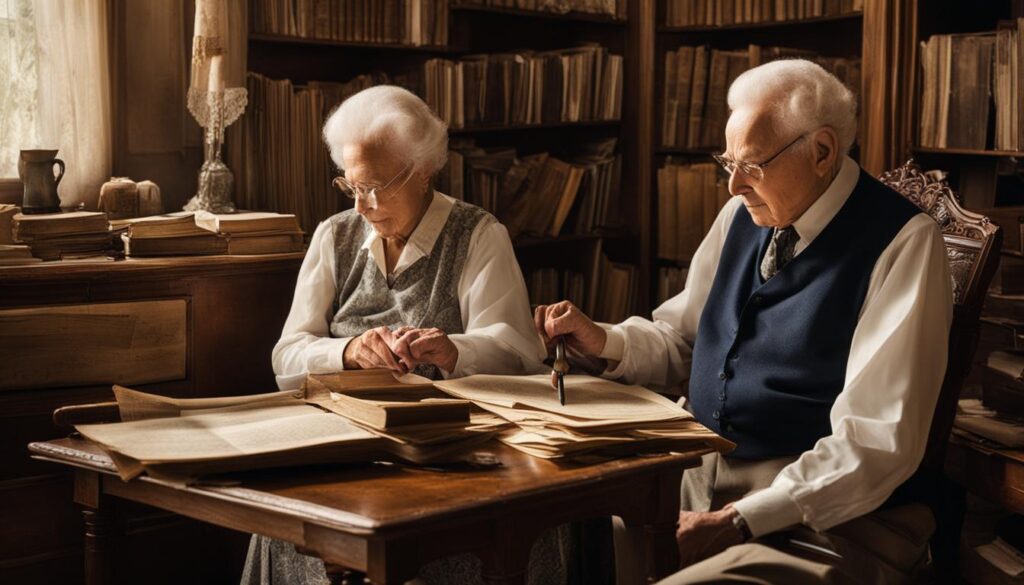Preserving your historical legacy and stories is important at any age, but particularly in your 70s. Archiving and preserving your assets, both physical and intangible, can help maintain the history of your work and creative practice, protect your brand, collect the stories of departing founders or leaders, track the provenance of artifacts, and decide what to keep when downsizing or moving. Additionally, this process allows you to reflect on your life’s journey and the impact you’ve made on those around you. By preserving memories in your 70s, you create a tangible legacy that can be shared with future generations, ensuring that your experiences and lessons learned are not forgotten. Taking the time to document your narrative also fosters a sense of closure and fulfillment, as you celebrate the chapters of your life that have shaped who you are today.
It’s never too early to start the archiving process, and doing it while your organization is thriving allows for better organization and the involvement of key individuals with institutional knowledge. Finding the right archive for your materials is crucial, and it’s important to research potential repositories and match your material with their collecting policies.
Key Takeaways:
- Preserving history is crucial, especially in your 70s.
- Archiving and preserving assets can maintain the history of your work and creative practice.
- Finding the right archive is crucial, match your material with their collecting policies.
- Start the archiving process while your organization is thriving for better organization.
- Research potential repositories to ensure your material is appropriately preserved.
The Importance of Archival Material
Preserving history and maintaining a legacy is a complex task that requires careful archiving and preservation of archival material. Archival material, which includes letters, photographs, business records, speeches, and more, plays a crucial role in preserving the history and legacy of an organization or individual. It provides valuable insights into the past, serving as a valuable resource for researchers, artists, and administrators.
Archival material also holds significant importance in maintaining donor rights, tracking provenance, and ensuring accurate storytelling. By preserving these non-current records, we are able to protect the enduring value they hold and ensure that future generations can access and learn from them.

Archiving and preserving archival material is not solely about preserving the physical records; it is also about capturing the stories, experiences, and knowledge embedded within them. Through proper archiving, we can document the evolution of organizations, trace the journeys of individuals, and provide a comprehensive understanding of our collective history.
Therefore, it is essential to recognize and prioritize the importance of archival material in preserving our history, heritage, and cultural identity. By safeguarding these records, we ensure that the past remains accessible and that future generations can continue to learn, be inspired, and build upon the foundations laid by those who came before us.
How Archives Work
Archives play a crucial role in preserving historical materials and providing valuable resources for researchers, educators, and the general public. Understanding how archives work can help individuals and organizations make informed decisions about preserving their history. Archives have specific purposes and collecting policies that guide their acquisition of materials. They collect and preserve records related to specific topical areas, time periods, geographic areas, or formats, ensuring that important historical documents are protected and accessible for future generations.
Archives function as research centers, providing students, faculty, and other researchers with opportunities to study and analyze historical materials. They house collections of primary sources such as letters, photographs, manuscripts, and audiovisual materials that offer unique insights into the past. Many archives also offer educational programs, exhibits, and events to engage the public and promote a deeper understanding of history and culture.
Collecting Policies and Research Center
Archives establish collecting policies to guide their acquisition decisions. These policies define the types of materials an archive seeks to collect and the criteria for accepting donations. Guidelines may include factors such as the relevance of the material to the archive’s mission, its historical significance, and its condition. By adhering to collecting policies, archives ensure that their collections align with their educational and research purposes.
Archives serve as invaluable research centers, offering a wealth of resources for scholars and students. They provide access to primary sources that foster original research and support a wide range of academic disciplines. Whether it’s tracing family genealogy, studying local history, or investigating broader historical narratives, archives are essential hubs for learning and discovery.
| Benefits of Archives | Examples of Educational Programs |
|---|---|
|
|
“Archives are the guardians of our collective memory, preserving the stories, documents, and artifacts that shape our understanding of the past. They provide a window into history, allowing us to learn from and connect with those who came before us.” – Dr. Sarah Johnson, Archivist
Whether you’re an individual looking to preserve your family’s historical records or an organization seeking to document your institutional legacy, archives offer expertise, resources, and a commitment to preserving and sharing our collective heritage.
Finding the Right Archive
When it comes to preserving your historical material, finding the right archive is essential. Whether you’re looking to preserve your family’s heritage or the records of your organization, choosing the right repository can ensure that your material is properly cared for and accessible to future generations.
One option to consider is your local library. Many libraries have special collections or archives that focus on local history. These archives are often interested in acquiring materials that relate to the community and can provide a valuable resource for researchers and historians.
If your material has broader historical significance, museums and historical societies may be a better fit. These institutions specialize in preserving and interpreting historical artifacts and documents. They often have more resources to dedicate to preservation and can provide a wider audience for your material.
| Archive Type | Benefits |
|---|---|
| Local library | – Focus on local history – Accessible to the community – Valuable resource for researchers |
| Museum | – Specialize in historical preservation – Dedicated resources for preservation – Wide audience |
| Historical society | – Expertise in historical preservation – Focus on specific historical topics – Community engagement |
For organizations with statewide or regional presence, state colleges, university libraries, and historical societies are suitable options. These institutions often have larger collections and can provide access to a wider audience.
If your material is artistically unique or highly visible, consider looking into regional or national archives. These archives often focus on collecting materials of national significance and have the expertise and resources to preserve and promote your material on a larger scale.
When researching potential archives for your material, it’s important to reach out to archivists and have conversations about your material and their collecting policies. This ensures that your material aligns with their mission and priorities, increasing the chances of successful preservation and accessibility.

Key Takeaways:
- Consider local libraries, museums, and historical societies for preserving material with local or regional significance.
- State colleges, university libraries, and historical societies are suitable options for organizations with statewide or regional presence.
- Regional or national archives are ideal for artistically unique or highly visible material.
- Reach out to archivists to ensure your material aligns with their collecting policies and priorities.
Celebrating Grandparents Day and Preserving Family History

Grandparents Day is a special occasion that provides an opportunity to celebrate the important role that grandparents play in our lives. It is also an ideal time to honor and preserve our family history for future generations. This day is celebrated on the first Sunday after Labor Day in the United States, and it serves as a reminder to cherish our grandparents and the valuable stories they hold.
One meaningful way to celebrate Grandparents Day is by conducting oral history interviews with your grandparents. This allows you to capture their unique life experiences, memories, and wisdom. Create a list of questions that delve into their childhood, family traditions, significant events, and personal achievements. Recording these interviews not only preserves their personal narratives but also strengthens the bond between generations.
“My grandparents’ stories have provided valuable insights into our family’s history and have shaped my identity. Their stories have inspired me and provided a deeper sense of connection to my heritage.”
In addition to oral history, exploring old family photos and heirlooms is another way to connect with your family history on Grandparents Day. Take the time to reminisce with your grandparents about the people, places, and memories captured in these photographs. This can lead to rich conversations and a better understanding of your family’s heritage. Consider organizing these photos into a scrapbook or digitizing them for easier preservation and sharing.
For those curious about their ancestral roots, Grandparents Day is an opportune time to conduct heritage research. Online genealogy platforms and DNA testing services can provide insights into your family’s migration patterns, ethnicity, and connections to distant relatives. Combine this research with visits to your grandparents’ hometowns or ancestral villages, immersing yourself in the places that shaped your family’s history.
In summary, Grandparents Day offers a chance to celebrate the lives of our beloved grandparents and to preserve our family history. Whether through oral history interviews, exploring family photos, conducting heritage research, or visiting ancestral hometowns, each activity contributes to a richer understanding of our heritage and the creation of a treasured record to pass down through future generations.
Conclusion
Preserving family legacy and personal history is a timeless endeavor that holds immense value. Whether it’s archiving organizational records, preserving family stories, or digitizing home videos, the goal is to protect and pass down our collective memories.
By taking the time to preserve and archive our historical assets, we ensure that future generations can learn from our experiences, connect with their roots, and appreciate the richness of their heritage. The tools and techniques available today make the process more accessible and manageable, whether it’s archiving at home or seeking professional services.
The key to preserving our history and legacy lies in starting the process and taking the necessary steps. Through the careful preservation of family legacy and the archiving of home videos, we can create a lasting record that will continue to be cherished for years to come.
FAQ
Why is preserving history and family legacy important?
Preserving history and family legacy allows future generations to learn from our experiences, connect with their roots, and appreciate the richness of their heritage.
What is archival material?
Archival material includes non-current records of organizations or individuals that are preserved due to their enduring value, such as letters, photographs, business records, speeches, and media.
How do archives work?
Archives collect material related to specific topics, time periods, geographic areas, or formats. They serve as research centers, present exhibits and programs, and offer educational opportunities.
How can I find the right archive for my material?
When looking for an archive, consider your target audience and research archives with specialties related to your organization’s work. Reach out to archivists and have conversations about your material and their collecting policies.
How can I celebrate Grandparents Day and preserve family history?
Interviewing grandparents, looking through old family photos and heirlooms, researching heritage online, organizing a scrapbook, and planning visits to grandparents’ hometowns are meaningful ways to celebrate the day and build a family tree.
What are some additional ways to preserve family legacy?
Additional ways to preserve family legacy include digitizing home videos, creating memoirs or oral histories, and archiving important documents and artifacts.
How Can I Plan for My Legacy and Heirlooms Alongside Preserving My Historical Legacy and Stories in My 70s?
Planning for your future heirlooms is a thoughtful way to preserve your historical legacy and stories in your 70s. Start by identifying items that hold sentimental value and consider passing them down to loved ones. Additionally, document your life experiences, memories, and family history through written narratives or video recordings. By combining both tangible and intangible aspects, you can ensure your legacy lives on for generations to come.


Pingback: Preserving Memories and Creating Legacies in Your 70s – Straight Fire Money